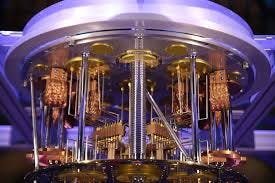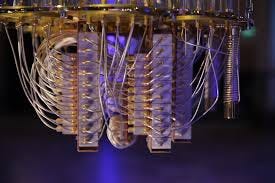Understanding Quantum Computers
Discover the fascinating world of quantum computers. Learn how they work, their potential impact on various fields, and what the future holds for everyday access to this revolutionary technology.
Imagine a computer so powerful that it could solve problems in seconds that would take our current machines millions of years. No, it's not science fiction—it's the exciting world of quantum computing, where bits become qubits and the impossible becomes possible. Let's dive into this technological marvel that might one day be as common as your smartphone!
A quantum computer is a supercomputer that exploits quantum mechanical phenomena or in other words, a quantum computer uses tiny particles to perform complex calculations. Unlike regular computers, quantum computers use qubits instead of bits!
A qubit means that it is either neither 0 or 1, think of it as a wave; it can go up and down at any given moment! This ability to be in multiple states simultaneously is known as superposition. At the same time, a bit in a classical computer is like a simple switch that can be either off (0) or on (1), a qubit can be both off and on simultaneously, providing an incredible amount of computational power. But how do they really work?
How Quantum Computers *Actually* Work
Superposition: As mentioned, qubits can exist in multiple states at once. This allows quantum computers to process a vast amount of information simultaneously.
Entanglement: This is a phenomenon where qubits become intertwined, so the state of one qubit can depend on another, no matter how far apart they are. This can massively increase computational power.
Quantum Gates: Similarto logic gates (a device that acts as a building block for digital circuits) in classical computers, quantum gates manipulate qubits. but because of superposition and entanglement, quantum gates can perform complex operations much faster than classical gates (smartphones, tablets, etc).
What Do Quantum Computers Look Like?
Unlike the sleek laptops and smartphones we use today, quantum computers look very different. They are usually large (5ft wide & 20ft long), complex machines housed in specialized laboratories. A typical quantum computer setup includes:
Cryogenic Systems: Quantum computers need extremely low temperatures to function, often close to absolute zero (kelvin or -273.15 degrees Celsius or -460 degrees Fahrenheit). This requires sophisticated cooling systems.
Quantum Processor: The heart of a quantum computer, where qubits are manipulated.
Control Systems: These are used to manage and operate the quantum processor, often involving complex electronics and software.
In other words, quantum computers are not something you can slip into your pocket or place on your desk. They currently require a highly controlled environment and are far from being household items.
Why Does This Matter?
The potential of quantum computers is amazing. Here are a few areas where they could make a significant impact:
Cryptography: Quantum computers could break current encryption methods, making our data vulnerable. However, they could also create unbreakable encryption.
Drug (Health) Discovery: They can simulate molecular structures much more efficiently than classical computers, speeding up the process of drug discovery and development.
Optimization: Quantum computers can solve complex optimization problems that are currently unsolvable, impacting industries from logistics to finance.
Pros and Cons of Quantum Computers:
Pros:
Speed: Quantum computers can solve problems in seconds that would take classical computers millions of years.
Power: Their ability to handle complex calculations could revolutionize fields like cryptography, material science, and artificial intelligence (AI).
Innovation: They could lead to new discoveries and advancements in technology that we can’t even imagine yet.
Cons:
Complexity: Quantum computers are incredibly complex and difficult to build and maintain.
Cost: The technology is expensive and currently out of reach for most organizations.
Security Risks: The potential to break current encryption methods poses a significant security threat.
Will We Ever Have Quantum Computers in Our Homes?
Given their current state, quantum computers are unlikely to become household items anytime soon. The technology is still in its infancy, and the machines are expensive and complex. However, as research progresses and technology advances, it’s possible that we could see more accessible forms of quantum computing in the future.
For now, the most practical application for everyday users will likely come through cloud-based quantum computing services provided by tech companies. This means you could potentially access the power of a quantum computer over the internet, without having to own one.
Quantum computers represent a leap forward in computing technology, with the potential to transform numerous fields and solve problems that are currently intractable. However, they also come with significant challenges and risks. As this technology develops, it will be crucial to balance its immense potential with the necessary safeguards to ensure it benefits humanity as a whole.




